Deborah J. Ross's Blog, page 79
September 25, 2018
My Story in It Happened at the Ball
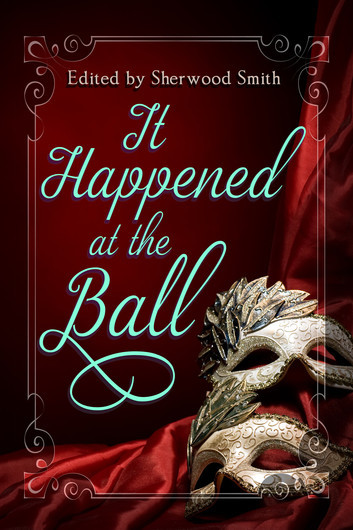 My story, "A Borrowed Heart," appears in the new anthology, It Happened at the Ball, edited by Sherwood Smith.
My story, "A Borrowed Heart," appears in the new anthology, It Happened at the Ball, edited by Sherwood Smith.Here's the skinny:
The pleasure of your company is requested.
Graceful feet tracing courtly steps.
Eyes behind jeweled masks meeting across a room of twirling dancers.
Gloved hands touching fleetingly—or gripping swords...
Anything can happen at a ball.
You are invited to enjoy these stories of fancy and fantasy from thirteen authors, framed in the splendor and elegance of a ballroom. Be it at a house party for diplomats and thieves, or Almacks in a side-universe in which the Patronesses have magic, or a medieval festival just after the plague years ...
Prepare to be swept into the enchantment of the dance!
"A Borrowed Heart" first appeared in The Magazine of Fantasy and Science Fiction (Sept/Oct 2011), and was later reprinted in their Russian-language "Best of" magazine (2012). It also appears in my collection, Transfusion and Other Tales of Hope (2015).
You can buy the ebook at Amazon, Barnes and Noble, Kobo, Apple/ITunes. A print edition is coming soon.

Published on September 25, 2018 01:00
September 24, 2018
Sword and Sorceress 33 Author Interviews: M P Erickson
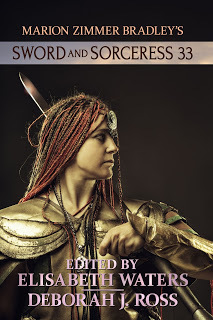 Enter a wondrous universe…the latest volume of Sword and Sorceress, featuring stories from new and seasoned authors. Herein you will find tales of fantasy with strong female characters, with some version of either martial skill or magic. Not all the protagonists will be human, and sometimes the magic will take highly original forms, but the emotional satisfaction in each story and in the anthology as a whole, remains true to the original vision. The release date will be November 2, 2018.
Enter a wondrous universe…the latest volume of Sword and Sorceress, featuring stories from new and seasoned authors. Herein you will find tales of fantasy with strong female characters, with some version of either martial skill or magic. Not all the protagonists will be human, and sometimes the magic will take highly original forms, but the emotional satisfaction in each story and in the anthology as a whole, remains true to the original vision. The release date will be November 2, 2018. ePub: https://www.books2read.com/u/b62gG6Kindle: https://amzn.to/2NitlHH
Deborah J. Ross: Tell us a little about yourself. How did you come to be a writer?
M P Ericson: I've been writing stories since I could hold a crayon. Somewhere I still have one I wrote when I was four. Also I was read to a lot, and taught myself to read. There were always plenty of books around. My grandmother owned a bookshop, and I pretty much lived there as a young child. I read everything I could reach. It was my dream to get my own stories up on the shelves with all the others.
DJR: What inspired your story in Sword and Sorceress 33?
MPE: I'd written a story from Katti's point of view (Crossing the Dead Line) and got interested in the relationship between her and Elyse. I've studied law and trained in martial arts, so exploring the contrast between the two was fun. Liane turned up at the practice ring, and the story grew from there.
DJR: What authors have most influenced your writing? What about them do you find inspiring?
MPE: Tolkien is my biggest influence – I read The Lord of the Rings as a child, and it blew me away. The sense of a new world taking shape in the ruins of an old one resonated with me. I grew up in Sweden, where Viking Age rune stones and Bronze Age rock carvings are part of the landscape. Most of my stories have traces of an older and deeper story somewhere in the background, which the characters aren't quite aware of.
Astrid Lindgren and Maria Gripe inspire me with their wistful tone and clarity of style. PG Wodehouse and Terry Pratchett with their offbeat humour and startling use of language. And Jane Austen with her mischievous wit. Those are the other main influences. But I have a magpie mind, I pick things up from all over the place.
DJR: Why do you write what you do, and how does your work differ from others in your genre?
MPE: I'm usually trying to capture an idea. Mood and tone are important to me, like in music or art. Perhaps there's an intensity in my work that's a bit different to most. A mythic quality, if you like. Being a migrant has probably affected me as well. My characters tend to be on the move, travellers in one sense or another. And I'm interested in relationships between people, what they see in each other and how that reflects themselves. Theodora Goss may be the closest in the genre. I'm a great admirer of hers.
DJR: How does your writing process work?
MPE: I start with an image. Something that pings the story circuits at the back of my mind. Then a character shows up, and then an opening line. That's when I start writing. Usually by the time I get to the end of the first page I know what's coming next, and then I carry on until I find the ending. If I go completely off the rails, I start a fresh draft and seldom look back. So by the time I have a complete draft I'm pretty much where I want to be. Revisions tend to be light. Sometimes I realise I'm missing a scene, or have one in the wrong place. Apart from that it's mostly tidying up, correcting typos and so forth.
DJR: What have you written recently? What lies ahead?
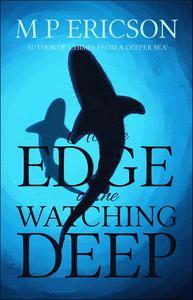 MPE: I wrote an underwater story about a shark recently (At the Edge of the Watching Deep), which was interesting. I've got some novel ideas brewing as well. I'd love to get back to the Battlehawk series.
MPE: I wrote an underwater story about a shark recently (At the Edge of the Watching Deep), which was interesting. I've got some novel ideas brewing as well. I'd love to get back to the Battlehawk series.DJR: What advice would you give an aspiring writer?
 MPE: Find your own process. There's so much great advice out there, but most of it probably won't work for you. That's OK. Just keep writing your own stories, and trust them to reach the right readers eventually. And do have an actual real life as well. Everything you experience becomes rich material for fiction, sometimes in the most unexpected ways.
MPE: Find your own process. There's so much great advice out there, but most of it probably won't work for you. That's OK. Just keep writing your own stories, and trust them to reach the right readers eventually. And do have an actual real life as well. Everything you experience becomes rich material for fiction, sometimes in the most unexpected ways.M P Ericson lives on the edge of a moor in Yorkshire, England, with an assortment of spiders and mice. Her stories have been published in magazines and anthologies all over the world.

Published on September 24, 2018 01:00
September 21, 2018
Short Book Reviews: Interstellar Chocolate Thieves
Free Chocolate, by Amber Royer (Angry Robot Books)
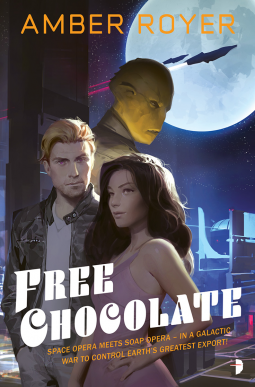 Ah, chocolate. It must be one of Earth’s finest natural creations, right? That’s the premise underlying this charming YA novel in which First Contact with all those alien worlds out there is not for the purpose of cultural exchange, mathematical enlightenment, military domination, or any of the hundreds of rationales. It’s to raid Earth of its chocolate! Well, and a few other things, too, like coffee and vanilla beans.
Ah, chocolate. It must be one of Earth’s finest natural creations, right? That’s the premise underlying this charming YA novel in which First Contact with all those alien worlds out there is not for the purpose of cultural exchange, mathematical enlightenment, military domination, or any of the hundreds of rationales. It’s to raid Earth of its chocolate! Well, and a few other things, too, like coffee and vanilla beans.Within a short time, humans and alien races are mixing freely, some combinations with more success than others, and chocolate production is rigidly controlled by a huge corporation, HGB – Hershey, Godiva, and Bissinger -- which “sprouted in the wake of the First contact War. They quietly made proprietary trade agreements with other planets…making it the most powerful organization ofn the planet.” Bodacious Benitez is living her life as a student, dating a gorgeous guy from Krom (whose irises change color depending on his emotions), when she’s catapulted into an interplanetary scheme to liberate chocolate. Her mother hosts an immensely popular cooking show, bolstering the HGB image.
The most charming aspect of the book, however, is its use of language. It’s told in first person, as is much YA today. Bo is fluent in several languages, notably English, Spanish (her birth language), and Portuguese. This makes sense when you think about it because most cacao-growing regions are Spanish or Portuguese speaking. Bo liberally strews her English with words in Spanish and teen-speak:
I need a hot shower and un poco alone time with Love Hurts, my favorite flufferiffic soap opera – a guilty pleasure Brill knows nada about.
Icy certainty settles in my stomach. I am muerto. Pero, I keep fighting the womborg [a wombat cyborg] anyway.
“Mamá, I only tell the celebarazzi things like how unfair it is that the chocolatiers have to work and extra hour…”
On the down side, the deliciousness of the language forced me to read more slowly than usual. Although most of the meanings can be deduced from context, I kept consulting my Kindle dictionary to get an added bit of certainty. This, combined with the length of the book, had the effect of flattening the dramatic intensity. There’s plenty of action in the story, but it takes place over such a stretched-out length that the overall shape of rising tension and climax, etc., is diminished. Nevertheless, I enjoyed the hours spent with Bodacious, Brill, and their friends.

Published on September 21, 2018 01:00
September 20, 2018
Guest Blog: Jane Lindskold on Emotional Continuity in Series
Jane Lindskold has been writing full-time since 1994. She is the New York Times bestselling, award-winning author of over twenty-five novels, including the acclaimed Firekeeper Saga, Changer, and the sword and sorcery classic When the Gods Are Silent. Her most recently released novel is Asphodel. She has also had published over seventy short stories.
Welcome, Jane!
Editor Deborah J. Ross interviewed me about writing, my story in the forthcoming issue of Sword and Sorceress and other things. In it, I touch on how negative influences have had a strong impact on my writing. Here’s an example.
Last week, I took a week off writing to immerse myself in various aspects of the Firekeeper universe before moving into the next part of the story. One of the complications about writing the seventh novel in a series is how easily it is to gloss over small details. Add to this that I haven’t written a Firekeeper novel in over a decade and the complexity grows.
By coincidence, my pleasure reading included a series I am enjoying very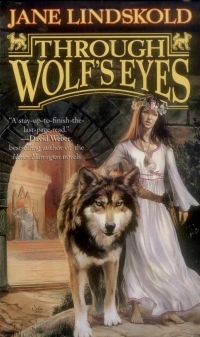 much – especially for the evolving relationships of the central suite of characters. I’m not going to go into details, but something I read made me think about an often neglected element of continuity – emotional continuity.
much – especially for the evolving relationships of the central suite of characters. I’m not going to go into details, but something I read made me think about an often neglected element of continuity – emotional continuity.
When something traumatic happens to a character, something that is key to a great deal of the action of that particular book, and then in the next book, something similar (but not identical) happens, I expect the characters to comment, to remember. When they don’t, my sense that the characters are “real” suffers.
I’m not saying that the author must provide a full recap of past events, not at all. However, real people remember what happened to them and those memories influence how they act in the future. Indeed, one could argue that our core self consists of an accumulated suite of experiences. Whenever something new happens, we seek to understand it by relating it to what we have experienced before. When something recurs, the most common reaction is “Here we go again!” Even new experiences are often understood by how they relate to past ones: “I’ve had milk chocolate with fruit and nuts, but never with chile pepper flakes!”
The importance of emotional or experiencial continuity is one reason that senility is such a horrible thing, not only for the sufferers, but for those who love them. The person you once knew is vanishing, in part because he or she cannot make those little connections to past events that are the heart of identity. PTSD is another side of emotional continuity. In this case, rather than remembering too little, the person is subjected to remembering too much – even to having traumatic experiences “flashback,” contaminating what in reality is a pristine or unconnected situation.
When I’m writing stories featuring continuing characters, what’s most important to me is to establish the sense that the characters have emotional continuity. To me that’s more important than dates or order of events. After all, humans do forget such details. We’ve all had those discussions as to whether it was two or three summers ago that Uncle Joe got that horrible sunburn. The sequence of events is less important than what those events did to us, and how our future actions are influenced by them.
Another element that goes into writing believable emotional continuity is making sure everyone doesn’t react the same way. Let’s go back to Uncle Joe’s sunburn. Uncle Joe is going to remember the pain, and maybe how dumb he felt for forgetting to renew his sunblock or for falling asleep out on the beach. Aunt Reba is going to remember not only her concern for Uncle Joe, but the fact that their long-planned anniversary outing ended up cancelled. Cousin Buck is going to remember how annoyed he was because Dad getting sick meant he had to call off the date he had with the pretty lifeguard. And so on…
When I read a book in a series where the characters seem to remember events perfectly well, but not react to current events in light of past experiences (especially when those experiences were traumatic), my sense that they are real begins to ebb. When they start reacting in light of events from decades before, but seem to forget what traumatized them two years ago, then I feel the fingers of a plot-driven author stirring the pot, rather than feeling the characters actually exist.
Does this ruin the read for me? Not necessarily, but it definitely makes me acutely aware of how I don’t want to do that to my characters – or to my readers. In thinking about what bothers me as a reader, I strive to become a stronger writer.
Now… Off to write!
When she is not writing, Jane delights in doing the impossible, including herding cats, wrangling guinea pigs, and tending a garden in the desert. You can learn more about her works, as well as find links to her social media, at www.janelindskold.com.
Welcome, Jane!
Editor Deborah J. Ross interviewed me about writing, my story in the forthcoming issue of Sword and Sorceress and other things. In it, I touch on how negative influences have had a strong impact on my writing. Here’s an example.
Last week, I took a week off writing to immerse myself in various aspects of the Firekeeper universe before moving into the next part of the story. One of the complications about writing the seventh novel in a series is how easily it is to gloss over small details. Add to this that I haven’t written a Firekeeper novel in over a decade and the complexity grows.
By coincidence, my pleasure reading included a series I am enjoying very
 much – especially for the evolving relationships of the central suite of characters. I’m not going to go into details, but something I read made me think about an often neglected element of continuity – emotional continuity.
much – especially for the evolving relationships of the central suite of characters. I’m not going to go into details, but something I read made me think about an often neglected element of continuity – emotional continuity.When something traumatic happens to a character, something that is key to a great deal of the action of that particular book, and then in the next book, something similar (but not identical) happens, I expect the characters to comment, to remember. When they don’t, my sense that the characters are “real” suffers.
I’m not saying that the author must provide a full recap of past events, not at all. However, real people remember what happened to them and those memories influence how they act in the future. Indeed, one could argue that our core self consists of an accumulated suite of experiences. Whenever something new happens, we seek to understand it by relating it to what we have experienced before. When something recurs, the most common reaction is “Here we go again!” Even new experiences are often understood by how they relate to past ones: “I’ve had milk chocolate with fruit and nuts, but never with chile pepper flakes!”
The importance of emotional or experiencial continuity is one reason that senility is such a horrible thing, not only for the sufferers, but for those who love them. The person you once knew is vanishing, in part because he or she cannot make those little connections to past events that are the heart of identity. PTSD is another side of emotional continuity. In this case, rather than remembering too little, the person is subjected to remembering too much – even to having traumatic experiences “flashback,” contaminating what in reality is a pristine or unconnected situation.
When I’m writing stories featuring continuing characters, what’s most important to me is to establish the sense that the characters have emotional continuity. To me that’s more important than dates or order of events. After all, humans do forget such details. We’ve all had those discussions as to whether it was two or three summers ago that Uncle Joe got that horrible sunburn. The sequence of events is less important than what those events did to us, and how our future actions are influenced by them.
Another element that goes into writing believable emotional continuity is making sure everyone doesn’t react the same way. Let’s go back to Uncle Joe’s sunburn. Uncle Joe is going to remember the pain, and maybe how dumb he felt for forgetting to renew his sunblock or for falling asleep out on the beach. Aunt Reba is going to remember not only her concern for Uncle Joe, but the fact that their long-planned anniversary outing ended up cancelled. Cousin Buck is going to remember how annoyed he was because Dad getting sick meant he had to call off the date he had with the pretty lifeguard. And so on…
When I read a book in a series where the characters seem to remember events perfectly well, but not react to current events in light of past experiences (especially when those experiences were traumatic), my sense that they are real begins to ebb. When they start reacting in light of events from decades before, but seem to forget what traumatized them two years ago, then I feel the fingers of a plot-driven author stirring the pot, rather than feeling the characters actually exist.
Does this ruin the read for me? Not necessarily, but it definitely makes me acutely aware of how I don’t want to do that to my characters – or to my readers. In thinking about what bothers me as a reader, I strive to become a stronger writer.
Now… Off to write!
When she is not writing, Jane delights in doing the impossible, including herding cats, wrangling guinea pigs, and tending a garden in the desert. You can learn more about her works, as well as find links to her social media, at www.janelindskold.com.

Published on September 20, 2018 01:00
September 19, 2018
Today's Moment of Art
Published on September 19, 2018 01:00
September 18, 2018
Auntie Deborah's Advice to a Young Writer Suffering From Writer's Block
 As a young writer, you’re probably grappling with learning many different literary skills at once. One is how to write a story, any length story. Another is how to determine the best length for a story idea. When I started selling professionally, over 30 years ago, the conventional wisdom was to begin with short stories and master craft issues at what was presumed a more manageable length, then go on to novels. (And this is what I did.) Since then I’ve met (and become friends as well as colleagues with) writers whose natural story length is long. Novels. Trilogies. Series. After years of writing at a pro level, most of then can write short as well, but it would have been a bad choice to begin with. Most, however, are just the opposite.
As a young writer, you’re probably grappling with learning many different literary skills at once. One is how to write a story, any length story. Another is how to determine the best length for a story idea. When I started selling professionally, over 30 years ago, the conventional wisdom was to begin with short stories and master craft issues at what was presumed a more manageable length, then go on to novels. (And this is what I did.) Since then I’ve met (and become friends as well as colleagues with) writers whose natural story length is long. Novels. Trilogies. Series. After years of writing at a pro level, most of then can write short as well, but it would have been a bad choice to begin with. Most, however, are just the opposite.So one possibility is that you’re attempting a novel before you have all the necessary literary tools. You may have a solid beginning idea but not the skill to develop it into enough substance to sustain 100K words, so you’re running out of steam, as it were. Perhaps you don’t know where the story is going and have written yourself into a dead alley, but don’t yet have the critical eye to see where you tied yourself into knots.
Another possibility, as I indicated above, is that a novel isn’t your natural story length. You may be trying to stretch a short story-sized idea over 500 pages. Or you may have insufficient twists and turns and whatever nifty stuff lights you up about writing so that all the fun has gone out of it.
Whatever you do, though, don’t give up. I can’t tell you how many of us who’ve gone on to successful careers writing novels have trunks of unfinished novels. If yours isn’t a source of joy, set it aside. Or steal the juicy bits and weave them together with new! improved! sparkly! bits. Try writing short or short-short. Try poetry. Write journal entries. Blog. Keep at it — and notice when you hit your stride. In other words, go where the fun is. The fun and the heartbreak and the adrenaline. That’s what will sustain you page after page, novel after novel, for an entire career.

Published on September 18, 2018 01:00
September 17, 2018
Sword and Sorceress 33 Author Interviews: Jane Lindskold
 Enter a wondrous universe…the latest volume of Sword and Sorceress, featuring stories from new and seasoned authors. Herein you will find tales of fantasy with strong female characters, with some version of either martial skill or magic. Not all the protagonists will be human, and sometimes the magic will take highly original forms, but the emotional satisfaction in each story and in the anthology as a whole, remains true to the original vision. The release date will be November 2, 2018.
Enter a wondrous universe…the latest volume of Sword and Sorceress, featuring stories from new and seasoned authors. Herein you will find tales of fantasy with strong female characters, with some version of either martial skill or magic. Not all the protagonists will be human, and sometimes the magic will take highly original forms, but the emotional satisfaction in each story and in the anthology as a whole, remains true to the original vision. The release date will be November 2, 2018. ePub: https://www.books2read.com/u/b62gG6Kindle: https://amzn.to/2NitlHH
Deborah J. Ross: Tell us a little about yourself. How did you come to be a writer?Jane Linskold: I’ve been a storyteller since I was very young, but I didn’t really make any sort of focused effort to write those stories down until I was a college undergraduate. By the time I finished my PhD, I knew that I wanted to be a fiction writer. Therefore, as soon as my dissertation was completed, I put the time I’d been using to write that into writing fiction. I had a lot of rejections, but finally started selling.
DJR: What inspired your story in Sword and Sorceress 33?JL: As far back as I can remember, I’ve always been interested in the non-human perspective. For various reasons, I found myself wondering what it would like to be a familiar. Many Fantasy stories feature familiars, but I couldn’t think of any where they weren’t either sage advisors, flippant commentators on the action, or (worst of all) simply another tool in the wizard’s kit. I decided to try my hand at writing a story from the familiar’s point of view, and this is what resulted. I very much like both the (currently nameless) familiar and the people it meets. I definitely plan to write more about them.
DJR: What authors have most influenced your writing? What about them do you find inspiring?JL: That’s pretty tough for me to answer because I’ve read very widely, both in the SF/F genre and without. The PhD I mentioned above is in Literature, so I’ve read a lot of mainstream material as well.
Although there are many authors whose work I have enjoyed maybe, in the final analysis, the biggest “influences” have been negative – the writers I have read whose work I have hated. These are the ones I’ve spent a lot of time thinking about, trying to assess why my reaction is so intense. Then, of course, I avoid doing those things!
DJR: Why do you write what you do, and how does your work differ from others in your genre?JL: I write in many voices, each meant to be the best way to tell that particular story. So, for example,Asphodel, Smoke and Mirrors, and Through Wolf’s Eyes are all written by me, but they are not in the least alike. So I’d say that my work differs from many others in my genre because the trend seems to be settling on one voice and style, then staying there.
DJR: How does your writing process work?JL: I’m an intuitive plotter, which means I don’t outline or plan much more than a scene or so in advance. When writing a novel, sometimes I’ll make myself notes as I go along, but often I end up changing direction even from those. I research intensely, sometimes before, often during, writing a piece.
DJR: What have you written recently? What lies ahead?JL: My most recently published novel is the short surreal Fantasy, Asphodel. Recent short fiction publications include “Unexpected Flowers” in Asimov’s and “A Green Moon Problem” in Lightspeed.
I’m currently working on the first Firekeeper novel in about ten years. I also have some short stories gnawing at the corners of my subconscious that I hope to squeeze in.
DJR: What advice would you give an aspiring writer?JL: On the creative side, persist. Listen to what other people say about their creative process, but realize there is no one-size-fits-all answer and search for your own. My book Wanderings on Writing is intended as a sort of craft box through which you can burrow, taking what is of use to you and discarding the rest.
On the business side, please note, it’s harder than ever to make a living as a full-time author, so be prepared to have a day job. Try not to have that day job involve writing. Most people have only so much writing in them per day. If you use that all as a journalist or professional blogger or whatever, you may find yourself dry by the end of the day when you sit down to write fiction.
If you’re not yet through college, don’t major in Creative Writing unless you either want to teach creative writing or plan to write literary fiction. If possible take a few business electives, especially one dealing running a small business and/or contracts. If you feel a real need to study the craft of writing SF/F, consider one of the specialized workshops. However, it’s possible to be a professional without ever attending one of workshops – I
 Jane Lindskold has been writing full-time since 1994. She is the New York Times bestselling, award-winning author of over twenty-five novels, including the acclaimed Firekeeper Saga, Changer, and the sword and sorcery classic When the Gods Are Silent. Her most recently released novel is Asphodel. She has also had published over seventy short stories.
Jane Lindskold has been writing full-time since 1994. She is the New York Times bestselling, award-winning author of over twenty-five novels, including the acclaimed Firekeeper Saga, Changer, and the sword and sorcery classic When the Gods Are Silent. Her most recently released novel is Asphodel. She has also had published over seventy short stories. When she is not writing, Jane delights in doing the impossible, including herding cats, wrangling guinea pigs, and tending a garden in the desert. You can learn more about her works, as well as find links to her social media, at www.janelindskold.com.

Published on September 17, 2018 01:00
September 14, 2018
Short Book Reviews: Victims No More
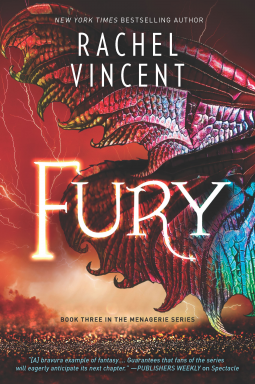 Fury, by Rachel Vincent (Harlequin)
Fury, by Rachel Vincent (Harlequin)This is yet another book I’ve innocently dived into, unaware it was part of a series. “Series” can mean a number of things, from stand-alone complete-in-themselves novels set in the same universe to one long story that extends over several volumes. Recently I listened to an interview with Peter Jackson in which he discussed the decision to not put a recap at the beginning of The Two Towers, the second part of The Lord of the Rings. He felt that one year between film was a short enough time for viewers (those few not intimately familiar with the books) to remember and anyone who went to see it without having seen or read The Fellowship of the Ring, oh well… I admit to not being as careful as I might about checking to see if a book is a sequel, so I rely on the skill of the author to furnish necessary backstory without inundating me with it, and to draw me into the story so that even if I have to work a little harder to figure out what has gone before, I’m already hooked.
Rachel Vincent’s Furydefinitely falls into this category. For the first couple of chapters I vacillated between “this is a sequel and I can’t keep straight who and what all these characters are” to “this is a stand-alone that brilliantly weaves the backstory into the present, trusting the reader to gradually put it all together.”
The book begins with parallel stories from the past and present. In the past, we learn of a mysterious rash of murders that leave one child survivor, always a six-year-old. In the present, a small band of cryptids (werewolves, redcaps, oracles, a minotaur, and the like), having escaped a brutal captivity, struggle to maintain their freedom while tracking down their abusers. Their journeys kept me reading on, dying of curiosity about how the two story lines would come together, and I was quickly so in love with these characters that discovering there were not one but two previous novels filled me not with disappointment but anticipation. There’s lots more, even if I read them in the wrong order. You, on the other hand, can reap the benefit of my experience and start at the beginning.
In some ways, this book made me think of the flip side of Seanan McGuire’s “Incryptid” series, which I like very much and have reviewed elsewhere. In McGuire’s world, as Vincent’s, these nonhuman people are at tremendous risk from the mundane world, only there is an extended family devoted to their protection and preservation. While it’s a terrible shame such heroes do not exist in the world of Fury, here the cryptids are their own saviors, which makes for a different but no less satisfying tale.
The usual disclaimer: I received an advance reading copy of this book, but no one bribed me to say anything in particular about it.

Published on September 14, 2018 01:00
September 12, 2018
Today's Moment of Art
Published on September 12, 2018 01:00
September 10, 2018
L'Shanah Tovah to All My Friends
Published on September 10, 2018 01:00









